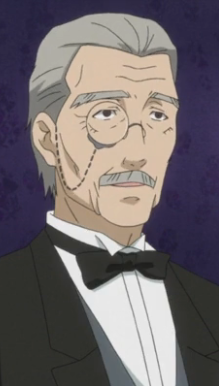Katakuriko Mado (TRP)
The Right Honourable Katakuriko Mado OM | |
|---|---|
 | |
| Prime Minister of the United Kingdom | |
| In office 5 April 1966 – 25 March 1984 | |
| Monarch | Regis Lucis Caelum CXII Regis Lucis Caelum CXIII |
| Preceded by | George Brown |
| Succeeded by | Jim Callaghan |
| Leader of the Labour Party | |
| In office 5 April 1966 – 3 December 1970 | |
| Preceded by | George Brown |
| Succeeded by | Jim Callaghan |
| Member of Parliament | |
| In office 15 June 1945 – 25 March 1984 | |
| Personal details | |
| Born | 14 May 1917 Sashima, Aomori, United Kingdom |
| Died | 2 May 1989 (aged 71) Perth, Western Austrakiba, Austrakiba |
| Political party | Labour (1961-1970) National Popular Party (1970-1984) |
| Spouse | Aki Sonada |
| Children | Kureo Mado |
| Residence(s) | 10 Leichestershire House |
| Alma mater | University of St. Georgius |
Katakuriko Mado (14 May 1917 - 2 May 1989) was a Lucian politician who served as the Prime Minister of the United Kingdom from 1966 to 1984. He imposed martial law on the United Kingdom in 1970 and ruled as a dictator until being ousted from power in 1984. His regime was infamous for its brutality and corruption.
A member of the Labour, Mado first entered Parliament in the 1945 general election. He was appointed to the Clement Smith Cabinet and had risen through the ranks by the end of the government's term. He ascended to significant positions in the Shadow Cabinet while Labour was in opposition, becoming the Deputy Leader under George Brown. When Brown led Labour to a narrow victory in 1964, Mado was appointed Secretary of State for Foreign Affairs.
Mado was on the right of the Labour Party, and shared private knowledge of Brown's alcoholism with many in the party. When by-election losses cut the government's majority to just one seat and Brown's drinking problem worsened, Mado challenged Brown for the leadership and won, becoming Prime Minister in February 1966. Encouraged by Labour's retention of a seat in a by-election the month before, Mado called a 1966 snap election the following month, at which Labour gained a majority of 96 seats.
Mado followed a moderate social democratic course as Prime Minister. He refused to undertake further nationalisations, and tried to improve the United Kingdom's economy by instituting a prices and incomes policy, and using indicative planning methods, creating a Department of Economic Affairs and a Ministry of Technology. His Chancellor wrestled with a balance of payments deficit and speculative attacks on the gil, requiring a devaluation in 1967. Tight fiscal policies, characterised by tax increases and spending limits, allowed the current account balance to return to a surplus. Several significant liberalising reforms were passed during Mado's term, including the abolition of death penalty and the reduction of the voting age, while spending on education, health, and social security increased.
The government had troubled relations with trade unions, as its planning policies injected it repeatedly into industrial disputes, and faced numerous strikes. An attempt to reform industrial relations in 1969 was scrapped due to opposition from the cabinet and unions. Mado also confronted growing nationalist movements in Aomori, Erebonia, and Tenebrae, following years of marginalisation and neglect under Conservative governments, to which he was personally unsympathetic. An assimilated christian detached from the Kisekidō-majority Miranian population of Aomori, his leadership crippled Aomorinese support for Labour — one of their crucial constituencies. Following the Aomori National Party's victory in a 1967 by-election, he grew more hostile towards nationalist parties, seeing them as a danger to the Union.
Growing unrest erupted in series of protests and riots between June and August 1968. Led mainly by students, leftists, and nationalists, the height of the riots came in the "Battle of Downing Street", where police attempts to suppress a demonstration escalated into violence and demonstrators rammed fire trucks through the gate of Downing Street, attacking 10 Leicestershire House and forcing Mado to be evacuated by helicopter. Following the Bombing of Sonada Square on 21 September 1970, Mado proclaimed the Absolution Law the next month, imposing martial law on the United Kingdom, and suspending the powers of Parliament and habeas corpus, beginning the period of United Kingdom history known as The Autarchy.
Ruling by decree, Mado abrogated civil liberties, imposed censorship on the media, and banned other parties, forcing them underground. He formed the National Popular Party as the only legal party — it won rigged elections in 1971, 1975, and 1979. Many opposition leaders and dissidents were arrested and abused by the police, including his son Kureo. Trade unions were amalgamated into a single government-controlled union, while further nationalisations took place, the proceeds of which benefited Mado's circle of cronies.
The Mado dictatorship isolated the United Kingdom on the international front, while the corruption of the period aggravated economic difficulties. Ultimately, the combination of a foreign exchange crisis and disastrous armed conflict with Acrea over the northern islands forced Mado out of office in 1984. He fled to Austrakiba, where he died in 1989.
One of the most controversial figures in United Kingdom history, Mado is known as the "bloody minister" for the deaths caused by his authoritarian rule. His successor Margarette Thatcher established a special commission to investigate and prosecute human rights abuses committed during his regime, and a special force to recover stolen money from the same period.